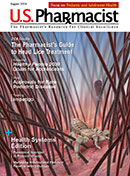As recently published in the Journal of the American Medical Association Network Open, a retrospective cohort study was conducted to assess interruptions in care and outcomes among patients with high-risk gastrointestinal (HRGI) cancer during the COVID-19 pandemic. The study included evaluation for signs of long-term changes in populations and survival.
The researchers screened and utilized data from the National Cancer Database to detect adult patients diagnosed with HRGI cancer (including esophageal, gastric, primary liver, or pancreatic) between January 1, 2018, and December 31, 2020. To be included in the study, patients had to be aged at least 18 years and have had just one primary cancer diagnosis in their lifetime. Data were analyzed between August 23, 2023, and September 4, 2023.
The study cohort included 156,937 patients, 54,994 (35.0%) of whom were aged 60 to 69 years and 100,050 (63.8%) were men.
The researchers found that “For stage, there was a proportional decrease in the diagnosis of stage I (–3.9%) and stage II (–2.3%) disease, with an increase in stage IV disease (7.1%) during the early months of the pandemic. Despite a slight decrease in 1-year survival rates in 2020 (50.7% in 2018 and 2019 vs. 47.4% in 2020), survival curves remained unchanged between years (all P >.05).”
The researchers also noted that after adjustment for confounders, diagnosis in 2020 was not correlated with increased 1-year mortality compared with 2018 to 2019 (hazard ratio, 0.99; 95% CI, 0.97-1.01). The rates of 30-day (2.1% in 2018, 2.0% in 2019, and 2.1% in 2020) and 90-day operative mortality (4.3% in 2018, 4.4% in 2019, and 4.6% in 2020) also remained comparable.
Operative mortality and 1-year survival curves among patients with HRGI cancers remained stable during the pandemic. However, in 2020, there were consistent rates of underdiagnosis, with no proportional expansion in newly diagnosed cases or stage migration throughout the remainder of the year.
Based on their findings, the researchers concluded that this retrospective cohort study demonstrated the risks linked to gaps in care and the considerable efforts of the cancer community to ensure continuous delivery of quality care during the pandemic. Future research should investigate long-term survival changes among all cancer types as additional follow-up data are accumulated.
The content contained in this article is for informational purposes only. The content is not intended to be a substitute for professional advice. Reliance on any information provided in this article is solely at your own risk.





